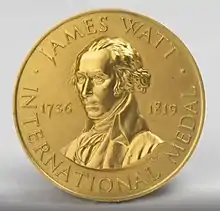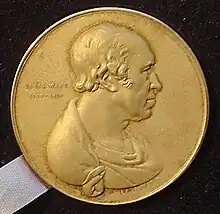James Watt International Gold Medal
The James Watt Medal is an award for excellence in engineering established in 1937, conferred by the Institution of Mechanical Engineers in the United Kingdom. It is named after Scottish engineer James Watt (1736–1819) who developed the Watt steam engine in 1781, which was fundamental to the changes brought by the Industrial Revolution in both his native Great Britain and the rest of the world.
James Watt International Gold Medal of the Institution of Mechanical Engineers

The James Watt International Gold Medal is awarded by the British to an outstanding mechanical engineer.
- "To commemorate the bicentenary of the birth of James Watt on 19 January 1736 - an event which was destined to bring about a revolution in the utilisation of power - the Institution of Mechanical Engineers award every two years a Gold Medal to an engineer of any nationality who is deemed worthy of the highest award the Institution can bestow and that a mechanical engineer can receive. In making the award, the Institution has sought the co-operation and advice of engineering Institutions and Societies in all parts of the world.
- To be worthy to receive a medal struck in commemoration of one who was at one and the same time a scientist, an inventor and a producer, the recipient himself should be an engineer who has achieved international recognition both by his works as a mechanical engineer and by the ability with which he has applied science to the progress of mechanical engineering."[1]
Recipients of the James Watt International Gold Medal are:[2]
| Year | Recipient | Nominated by | Achievement | |
|---|---|---|---|---|
| 1937 | Sir John Aspinall | The Institution of Mechanical Engineers | Locomotive designer | |
| 1939 | Henry Ford | American Society of Mechanical Engineers | ||
| 1941 | Professor Aurel Stodola | Swiss Society of Engineers and Architects, Czechoslovakia Society of Engineers, Engineering Institute of Canada | Steam turbine engineer | |
| 1943 | Anthony Michell | Institution of Engineers, Australia, South African Institute of Engineers, Engineering Institute of Canada | ||
| 1945 | Dr Frederick Lanchester | Institution of Mechanical Engineers | ||
| 1947 | Professor Stephen Timoshenko | Swiss Society of Mechanical Engineers and Architects | ||
| 1949 | Dr Fredrik Ljungström | Swedish Society of Engineers | ||
| 1951 | Dr Hans Henrik Blache | Danish Society of Engineers | ||
| 1953 | Sir Harry Ricardo | Institution of Mechanical Engineers | ||
| 1955 | Dr Igor Sikorsky | American Society of Engineers | ||
| 1957 | Professor Walther Bauersfeld | Verein Deutscher Ingenieure | ||
| 1959 | Sir Claude Gibb | Institution of Engineers, Australia, Institution of Mechanical Engineers | ||
| 1961 | Professor Dr Theodore von Karman | American Society of Engineers | ||
| 1963 | Sir William Stanier | Institution of Mechanical Engineers | English mechanical engineer and locomotive designer | |
| 1965 | Professor Sir Geoffrey Taylor | Institution of Mechanical Engineers | ||
| 1967 | Academician Ivan Ivanovitch Artobolevskii | Academy of Sciences of the USSR | ||
| 1969 | Dr Hideo Shima | Japan Society of Mechanical Engineers | Chief engineer of Tōkaidō Shinkansen high speed train | |
| 1971 | Dr Robert R. Gilruth | American Society of Mechanical Engineers | ||
| 1973 | The Rt Hon the Lord Hinton of Bankside | Swiss Society of Engineers and Architects | ||
| 1975 | Professor Dr-Ing Siegfried Meurer | Verein Deutscher Ingenieure | ||
| 1977 | Air Commodore Sir Frank Whittle | New Zealand Institution of Engineers | ||
| 1979 | Raymond Heacock | American Society of Mechanical Engineers | ||
| 1981 | Professor J. P. Den Hartog | Institution of Mechanical Engineers | Professor emeritus and former head of the department of mechanical engineering at the Massachusetts Institute of Technology | |
| 1983 | Sir Christopher Cockerell | Institution of Mechanical Engineers | ||
| 1985 | Sir Hugh Ford | Institution of Mechanical Engineers | ||
| 1987 | Sir Denis Rooke | Institution of Mechanical Engineers | ||
| 1989 | John E Steiner | Fellowship of Engineering | ||
| 1991 | Soichiro Honda | Japan Society of Mechanical Engineers | ||
| 1993 | Frédéric d'Allest | Comitedes Applications Académie des Sciences, France | Aero and space engineer, head of ISAE and Arianespace | |
| 1995 | Eiji Toyoda | Japan Society of Mechanical Engineers | ||
| 1997 | Sydney Gillibrand | Institution of Mechanical Engineers | ||
| 1999 | Professor Sir Bernard Crossland | Institution of Engineers of Ireland | ||
| 2001 | Professor Duncan Dowson | Institution of Mechanical Engineers | ||
| 2003 | Sir Ralph Robins | Institution of Mechanical Engineers | ||
| 2005 | Leroy 'Skip' Fletcher | American Society of Mechanical Engineers | ||
| 2008 | Professor Emeritus John Spence | Institution of Mechanical Engineers | ||
| 2010 | Professor Roger Morgan Goodall | Institution of Mechanical Engineers | ||
| 2012 | Sir Sze-yuen Chung | Institution of Mechanical Engineers | ||
| 2014 | Professor Richard Parry-Jones | Institution of Mechanical Engineer | ||
| 2016 | Professor Dame Ann Dowling | Institution of Mechanical Engineers | ||
| 2019 | Sir David McMurtry | Institution of Mechanical Engineers | For a lifelong emphasis on research and development | |
| 2021 | Prof. Emeritus Izhak Etsion | Technion - Israel Institute of Technology | For outstanding contributions in the field of Tribology |
James Watt Medal of the Institution of Civil Engineers

The James Watt Medal is also a lesser known award of the British Institution of Civil Engineers (ICE) for energy engineers.
From the Institution of Civil Engineers website:[3]
- "The James Watt Medal is awarded for papers having a substantial mechanical engineering content. The medal, named after James Watt, the Scottish mechanical engineer and inventor who died in 1819, was introduced by Robert Stephenson (President of ICE in 1855-1856) who recommended Council to acquire the dies of the medal from Joseph S Wyon in 1858."
Recipients of the James Watt Medal of the Institution of Civil Engineers include:
- 1880s? Basil Wood for his work on Combined Heat and Power
- 2000 Paul Kassabian. Structural engineer with interests in design, dynamic control, and deployable structures.[4]
- 2000 Professor Sergio Pellegrino. Professor of Structural Engineering at the University of Cambridge. Specializes in deployable lightweight structures.
- 2005 Choo Yoo Sang, J W Boh, and L Louca.
- 2009 Dick Fenner and Joan Ko for "Adoption of energy efficiency innovations in new UK housing"
- 2010 Neil Chapman for paper on radioactive waste disposal
- 2014 Malcolm Joyce
- 2019 Tobias Lühn and Jutta Geldermann for "Optimising power grids using batteries and fuzzy control of photovoltaic generation"